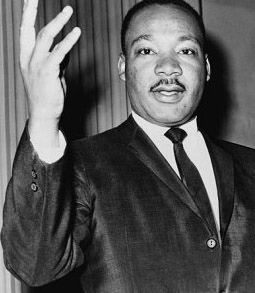50 Years Later - Failing The Dream
 Today the Nation commemorates the life and work of Martin Luther King, Jr. with a Federal holiday. Excerpts of Dr. King's 1963 "I Have a Dream" speech will be replayed in the news media, along with high-minded commentary about the relevance of the speech to the current generation. Sadly, the words intended as a call to action, particularly for our elected leaders, have yet to show meaningful results in the area of black employment.
Today the Nation commemorates the life and work of Martin Luther King, Jr. with a Federal holiday. Excerpts of Dr. King's 1963 "I Have a Dream" speech will be replayed in the news media, along with high-minded commentary about the relevance of the speech to the current generation. Sadly, the words intended as a call to action, particularly for our elected leaders, have yet to show meaningful results in the area of black employment.
Among the many compelling statements of Dr. King was this observation: "One hundred years later, the Negro lives on a lonely island of poverty in the midst of a vast ocean of material prosperity." Perhaps the most compelling aspect of this observation is that not much has changed since Dr. King uttered these words 50 years ago in front of the Lincoln Memorial before 200,000 people gathered there for the March on Washington for Jobs and Freedom.
Unemployment is the reason why Dr. King's dream remains largely unfulfilled for many black Americans. According to the Economic Policy Institute, the overall employment situation of black Americans remains near depression-level conditions:
- From the 1960s to today, the black unemployment rate has remained unchanged at about 2 to 2.5 times the white unemployment rate.
- An estimated 19.6 percent of black workers (nearly one in five) were unemployed at some point in 2013.
- The 2013 unemployment rate for blacks was 13.1 percent, far higher than the highest overall annual unemployment rate over the last 70 years.
- Unemployment projections for 2014 show it is likely that 17.4 percent of black workers will be unemployed at some point this year.
The employment situation among black teenagers is nothing less than grim. Overall teenage unemployment ranges from 25-35 percent, with black teens as high as 70 percent, according the U.S. Department of Labor.
For black teens without a part-time job, the gap in experience and skills puts them at a severe disadvantage as they compete for full-time jobs when they reach their twenties. The longer they go without a job, perhaps dropping out of the job market entirely, the less able they are to get hired when the economy improves to a point when labor demand is strong.
There are other economic conditions plaguing black Americans. In its "2013 State of the Dream" study, United for a Fair Economy pointed out that between 2007 and 2010:
- Black families lost 27.1 percent of their average net worth
- Black families had a higher debt burden
- Black families had slightly more than $17,000 in retirement accounts compared to $109,000 for the average white family
- The average net worth of blacks was $97,995 compared to $629,736 for whites
The "2013 State of Black America" released by the National Urban League pointed out that on average black Americans enjoy less than three-fourths of the benefits and privileges offered to white Americans.
In today's sluggish economy, where there is high unemployment, sluggish job growth and stagnant or low wage growth, the employment prospects for blacks in 2014 look bleak, especially considering that most of the jobs being created are minimum-wage jobs that cannot sustain individuals, let alone families.
Seemingly oblivious to the plight of black Americans, our political leaders are devoting a lot of time and energy to immigration reform, which promises to make the situation of black Americans even worse, particularly for those unskilled. Granting amnesty and a path to citizenship for 11 million+ undocumented immigrants would have the effect of keeping wages down for all unskilled and semi-skilled workers.
Those who rely on faulty research to "disprove" the linkage between cheap immigrant labor and high unemployment among black Americans willfully ignore a fundamental market dynamic: when there is an abundance of labor to fill a limited number of jobs, wages will remain the same or go lower. If our economy had more jobs than available applicants, wages would increase. Since wages have been relatively stagnant for the past 20 years, it is disingenuous to claim that adding millions more job-seekers to the mix will suddenly cause wages to go up.
In his famous speech, Dr. King also said: "One hundred years later, the Negro is still languished in the corners of American society and finds himself an exile in his own land." If Congress bows to the demands of pro-amnesty advocates, black Americans suffering chronic unemployment or underemployment may indeed feel even more isolated. In Dr. King's view, that would be as "shameful" a condition now as it was 50 years ago. Even more shameful are the actions of some political leaders who push for open border policies, while ignoring the needs of many black Americans and other citizens who struggle to find work.
